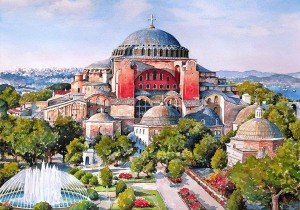 Having shared with my readers my thoughts on the Little Entrance with the Gospels, I would guess that they will quickly understand the symbolic meaning of the Great Entrance. Again, the sequence is the same. The gifts – symbols of life (i.e., food symbolized by bread and wine) – are brought from the Altar area (representative of Heaven), into the world of faith (Nave), and, of course, leading back to the very Throne of God (altar or Holy Table). During the Great Entrance, we must attempt to make ourselves aware of this symbolism. Life comes from God. The Life of Jesus, Who first used bread and wine to symbolize Himself, leads us back to God when we join ourselves with Him. This is the important point, I believe. We are called to join ourselves with Jesus and to offer praise to the Father by offering our lives back to Him in true thanksgiving for the gift of life. This is what Jesus did. He offered His human life back to the Father in true thanksgiving for the gift of human life. This is the sense of worship that Jesus shared with us. He did not offer other things to the Father like His religion did (e.g., lambs, doves heifers). Rather He offered Himself! This is true worship as revealed to us by God through Jesus.
Having shared with my readers my thoughts on the Little Entrance with the Gospels, I would guess that they will quickly understand the symbolic meaning of the Great Entrance. Again, the sequence is the same. The gifts – symbols of life (i.e., food symbolized by bread and wine) – are brought from the Altar area (representative of Heaven), into the world of faith (Nave), and, of course, leading back to the very Throne of God (altar or Holy Table). During the Great Entrance, we must attempt to make ourselves aware of this symbolism. Life comes from God. The Life of Jesus, Who first used bread and wine to symbolize Himself, leads us back to God when we join ourselves with Him. This is the important point, I believe. We are called to join ourselves with Jesus and to offer praise to the Father by offering our lives back to Him in true thanksgiving for the gift of life. This is what Jesus did. He offered His human life back to the Father in true thanksgiving for the gift of human life. This is the sense of worship that Jesus shared with us. He did not offer other things to the Father like His religion did (e.g., lambs, doves heifers). Rather He offered Himself! This is true worship as revealed to us by God through Jesus.
So, it is critical that we, during the Great Entrance, join with the symbols of life, bread and wine, and join with our Brother Jesus, and offer our lives back to God. When we truly do this, God, through the power of His Spirit, transforms our lives and makes us ever more like Jesus, the only-begotten of the Father.
Again, during the Great Entrance we are called to think about the bread and wine as “symbolizing our own lives” and intentionally offering our lives back to the Father, in union with Jesus and others, in an act of true thanksgiving for the gift of life.
When we intentionally, voluntarily do this, our act of worship takes on a whole new meaning for us. We actually become truly engaged in the act of worship, together with Jesus. What we do during the Divine Liturgy should not be to us like watching a program on television. We must make the actions and words of the Liturgy our words and actions. When we participate in the Divine Liturgy in this manner, that is something that happens: we worship God.
Our Ukrainian Greek-Catholic Church calls us to this type of participation. It is something to be experienced and not just some kind of intellectual exercise. It is one thing to think about worshipping God and another to actually worship Him.
